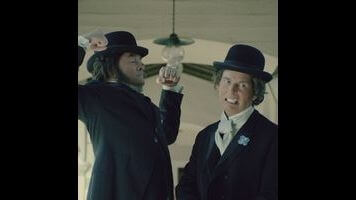And as far as “Shitshows” goes, the stories are just okay. Much like the season premiere, this is a good though not totally spectacular episode of Drunk History. In that way, the season’s structure mimics that of most of the stories told on Drunk History: The best parts are in the middle. I was certainly expecting something a little more, especially with three brilliant narrators on board, including one of my personal favorites, Jenny Slate. But even though three slightly bizarre stories are told over the course of the episode, driven by eccentric figures from history, all the pieces just don’t quite fall into place.
In Slate’s segment, it’s an issue of pacing. Slate is one of my favorite Drunk History narrators because she’s a genuine weirdo, and she makes noises and observations that only she can make. She’s rightfully given the strangest story of the episode, a retelling of the the Cherry sisters, responsible for the worst vaudeville show in history. The story’s a good match for Slate, especially since the bulk of it is just Slate detailing their terrible show, which allows her to make up the song “Corn Juice” and provide the dialogue a weird sketch taking place in a bathtub.
Jessie Ennis, Mary Lynn Rajskub, Ashley Johnson, Andrea Savage, and Allison Tolman give excellent performances as the Cherry sisters, matching Slate’s weirdness with fun and goofy physical comedy. But there are too many characters at play for any one sister to stand out, leaving the story a bit anchorless. And Slate’s structuring of the story alternates between rushed and sluggish. That’s understandable given her level of intoxication, but that’s where Drunk History’s editors usually work their magic. The best moment of the segment comes at the end, when Slate notes that the Cherry sisters died in obscurity even though they didn’t think so. “What they thought is kind of all that matters, don’t you think?” That uninhibited earnestness both reflects Slate’s personality and lets the story end on an oddly profound note.
Allan McLeod similarly infuses his retelling of the rivalry between Shakespearean actors Edwin Forrest and William Macready with some natural weirdness. Again, as with Slate, the funniest parts are when he’s making up dialogue for the stage: “Lady Macbeth, what’s going on, what’s for dinner tonight?” According to McLeod, the opening monologue from the witches goes like this: “Bubble bubble toil and trouble, cauldron burns, and here’s Macbeth here he coooomes!” But it’s Jack McBrayer who really sells the segment—funny every second he occupies the screen.
Bob Odenkirk has been a part of Drunk History’s reenactments before, but this was his first time in the narrator seat, and he was unsurprisingly great at it. Odenkirk is a fantastic storyteller, and that talent apparently still comes through even when some tequila is thrown on top. The different voices he does in his story about 1979’s Disco Demolition Night add dynamics and fun to the story, but overall, the retelling lacks compelling characters. Odenkirk attempts to make some larger connections at the end, noting that the demolition night didn’t kill disco so much as send a message, but the story’s structure lacks stakes and hooks. Odenkirk’s fake disco song is the best part of the segment. All of the highlights of this episode were moments when the narrator went on a quick improvised tangent that ultimately had no bearing on the actual story.
Drunk History is far from a shitshow in its season four finale, but it almost could have skewed a little more off-the-rails. It clips along, business as usual. Fortunately, the rest of the season had more surprises to offer.
Stray observations
- I suppose it was always going to be hard to top last week’s “Hamilton.” Really though, this finale wasn’t. It just wasn’t quite as exciting as the past several weeks have been on the show.
- What an odd Ben Folds cameo that was.
- I love that Slate’s dogs are always present for filming.
- And thus ends another season of Drunk History. I love this show dearly. Raise a glass to (hopefully) many more seasons to come!
- What’s your favorite memory from the season? Mine is probably the Stonewall riots retelling, tied with John Cho as Shakespeare.

